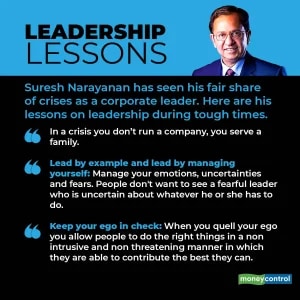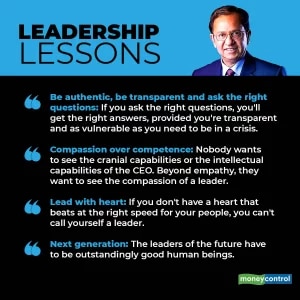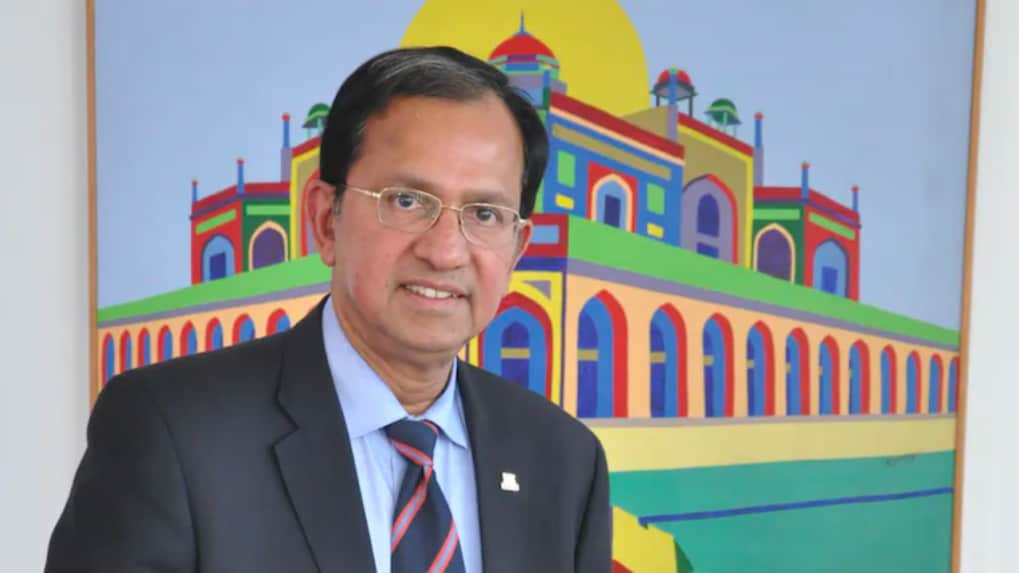I want to create leaders who are better than me: Suresh Narayanan
“Compassion over competence in a crisis. There are very competent people. The world is full of very bright people. But at this stage nobody wants to see the cranial capabilities or the intellectual capabilities of the CEO. They want to see the compassion of the CEO. The leaders of the future have to be outstandingly good human beings. You can be competent, brilliant, qualified from the best institutions but if you don't have a heart that beats at the right speed for your people, you can't call yourself a leader.”
ADVERTISEMENT
FMCG companies across the board are feeling the pinch of inflationary trends. Nestle, the maker of major brands like Maggi and Nescafe, is no different. In an exclusive conversation with Storyboard18's editor Delshad Irani, Nestle India’s managing director and chairman, Suresh Narayanan, tells us how the company is sustaining all the momentum in consumption that came during the pandemic for flagship brands like Maggi and meeting customer expectations in challenging times. We dig into trends like D2C and healthy-aging, and how Nestle is expanding its health and wellness bandwidth as a company. Plus, Narayanan shares his leadership lessons during a crisis and he tells us why he is one of the most responsive chief executives on LinkedIn. Edited excerpts:
How has 2022 been for Nestle India so far? How are you sustaining all the momentum in consumption that came during the pandemic for flagship brands like Maggi?
One of the striking features of 2022 has really been unrelenting inflation on commodities that we are faced with. 9 or 10 of our top 13 commodities we procure as a company have crossed their ten-year high. The cumulative inflation in the last three years has essentially met or surpassed the inflation that we are facing today. So, really the commodity inflation is something that is here with us and that is something that we have to cope with.
On the other hand, I must say that the demand for our mainstream brands has been fairly robust. Most of our portfolio is doing well. But the one thing that we have to really combat in the short to medium term is commodity inflation. How do you deal with it in terms of efficiencies, in terms of effectiveness, and also in terms of pricing. So those are some of the concerns that one is combating at this point in time.
Also read: Why we've been craving Maggi during the pandemic
Maggi is now a four decade old brand, it’s an iconic brand, which had a dramatic turnaround when it came back from the brink after the lead crisis. How are you looking at unlocking the next level of growth for a brand like Maggi?
Maggi is really a classic example of a brand that has been mass customized even before the word has been fully digested by marketers. Everybody has an association with it. There’s a Suresh version of Maggi. There’s a Delshad version of Maggi. Everybody has their own version of Maggi.
Yes, it’s a brand that went through some very difficult times. But I’m glad to say that thanks to the consumers, stakeholders and employees of the company, the brand has come back very strongly and rose to greater heights during the pandemic.
Today, the brand’s ecosystem is much bigger than brand Maggi itself - the number of wheat farmers, factory workers, spices and packaging suppliers, and number of vendors who actually sell Maggi across the country, that number runs into hundreds of thousands if not millions. So the footprint of the brand is very big and it's really growing each day. It is going from strength to strength, the strength comes from three platforms.
Number one is innovation, and innovating constantly across variants. Number two is Maggi is now more digital than it ever was. In the last two years, the digital connection with our consumers, whether it is recipe searches, recipe provisions or the experiential part of Maggi and ensuring that consumers talk about Maggi, has become a very important aspect of the brand.
And the third is our sustainability initiatives. A number of initiatives are being put through. As a brand we have been plastic neutral for the last two years. Sustainable farming for spices, we work across five states with almost 2000 to 3000 farmers working on sustainable agricultural practices in growing spices, and also the traceability of spices. During the pandemic we began the Apna Food Business initiative to incentivize and to encourage women entrepreneurs, with training and seed capital.
So there are different initiatives around sustainability and the food business, and really trying to see how the ecosystem of Maggi can become stronger and even more robust.
What’s the strategy in terms of how you handle these challenges and meet consumer expectations when it comes to Maggi’s pricing?
It is definitely very challenging because you know Maggi is almost a common staple in many homes, across income status. That is something that we are very cognizant of. Typically, in a difficult situation as far as commodity inflation is concerned, there are two or three vectors that the company uses. The first one is because of the sheer scale of Maggi, there are economies of scale in terms of buying at the right time, stocking at the right time and really ensuring that you try and minimize the input cost impact that you start feeling from one period to the other.
Number two is we do have a cost efficiency program almost contributing to 1 to 2 percent of sales, we call it sharp savings, which is really operational savings, packaging savings and other related savings. For example, on Maggi, in the last two to three years, there’s been an almost 7 to 8 percent reduction in the amount of packing materials that have been used. So there are efficiency parameters that we work on in order to reduce the cost and only after one and two, which is really the economies of scale and the efficiencies and effectiveness are not fully satisfied do we touch pricing. So pricing is really only the third vector that we operationalize.
But as I told you, the scale of inflation has been rather stiff this year. I mean, 2019, 2020 and 2021 has been more than offset by the impact that we’re facing in 2022. Almost every single element of the value chain has had a substantive increase in costs. So we're trying to do our best to ensure that we mitigate as best as possible the impact that we’re facing. And yet, I’m afraid we've had to, with deep regret, pass on some of the price increase to consumers as well.

We’ve seen a huge influx of D2C brands in food. How are you seeing the D2C brand space play out and how is Nestlé growing its presence in D2C?
The D2C space is really becoming very interesting. Also very challenging because you have to find a differentiator for the consumer experience between buying on organized trade or ecommerce or the general trade versus buying on a D2C platform. So the degree of differentiation really has to be quite acute and quite sharp in order for it to work.
Secondly, D2C is becoming very attractive because consumers are now looking at brands as not just products to be consumed but they're also looking at it as a reflection of their own lifestyles. So whatever they are looking for in their lifestyles in terms of nutrition, health, wellness, advice, tips, etc, all of this engagement has been built into a D2C platform. As I speak to you, we are working on a platform and we will be making our foray into it. However, we just want to ensure that whatever experience we give it is robust and adequate enough to satisfy the most discerning consumers. Nestle would not like to put a half foot forward. We want to put a firm foot forward.
People are becoming more conscious about how they live, what they consume and what they eat. How is Nestle addressing the trend toward more healthier living? Because at the end of the day you are in the business of making snacks, beverages and confectionery.
There's nothing called good nutrition or bad nutrition. It's all about balanced nutrition. During the pandemic we saw two or three things come out very clearly. Number one is that consumers are looking for nutrition and immunity. Second is the preference for quality and the safety of a brand over any other parameters. But they are still seeking value and because of the economic consequences of the pandemic, there are segments of consumers whose budgets are being stressed. And therefore they're looking at better value offerings that companies can give. So, for us, the journey has been to improve the quality of the nutrition that we seek to offer, whether it is Maggi or milks and nutrition or in any other part of our portfolio, to make better, healthier and more relevant offerings.
We are looking at products in healthy snacking, whether it is grain based or protein based. The whole area of plant-based proteins is becoming an additional source. The question is one of adapting plant-based proteins into the Indian context and cuisines' relevance rather than just lifting concepts from the west.
We’re looking at entries into areas like Healthy Aging. As India grows more prosperous and as our population growth rates decline, we also are becoming more of an aging population. The 60-plus population is gradually creeping up in this country. And these are the people who also have the money in their pockets. They earned reasonably well and saved prudently, and now they're looking at products and offerings that can keep them healthy and happy as they grow older.
So these are a couple of areas that we certainly are looking at quite aggressively to develop some of these products and really expand the nutrition and wellness bandwidth of the company as we go forward.
How has your leadership style evolved, particularly given the life-changing global events of the past three years? What aspects do you dial up in tough times?
Having spent four decades in the trenches, there is an advantage and a disadvantage. The advantage is that my leadership style is settled and it is not something that is going to be variable. The disadvantage is that it is prone to less change as one would expect of a leader perhaps 20 years younger.
What for me has been the central theme of this pandemic has been a phrase that I use reasonably often - In a crisis you don’t run a company, you serve a family. I honestly believe that a company is like a family. It's a family of employees, colleagues, partners, stakeholders and of people who have got some stake and some involvement in your business and the larger ecosystem.
In a crisis, you lead by example and you lead by managing yourself. So the biggest challenge is a capability to be able to manage yourself, your emotions, your uncertainties, your fears, because the fact of the matter is that people don't want to see a fearful leader. They don't want to see a leader who spins in his boots and is uncertain about whatever he or she has to do. So number one is managing yourself.
Number two is keeping your ego in check. This is not about you. It is not about how brave you are and what a super human being you are. What happens when you quell your ego is that you generally allow people to do the right things in a non intrusive way, in a non threatening manner in which they are able to contribute the best they can.
A leader has to be authentic and transparent. It is not for me to show my people that I am a superhero but I am as human and that I need to be able to not answer all the questions. I need to be transparent and ask the right questions. If you ask the right questions, you'll get the right answers, provided you're transparent and provided you are as vulnerable as you need to be in a crisis.
Fourth, compassion over competence in a crisis. There are very competent people. The world is full of very bright people. But at this stage nobody wants to see the cranial capabilities or the intellectual capabilities of the CEO. They want to see the compassion of the CEO. What happens to him when there is a death in the family of an employee? What happens to him when there is a serious illness around? How does he react when people and the community around him are suffering? Does he reach out, going beyond empathy and acting with compassion? Or is he only a person who's bothered about the top line, center line and the bottom line?
These are lessons in leadership. The leaders of the future have to be outstandingly good human beings. You can be competent, brilliant, qualified from the best institutions but if you don't have a heart that beats at the right speed for your people, you can't call yourself a leader.

Many CEOs today have become social media influencers. But you are one of the most responsive CEOs I’ve seen. Tell me what’s your approach to how you address and respond to your employees, colleagues, customers and consumers on platforms like LinkedIn?
I don't mean to boast but when we were young managers, each one of us had a dream of what we would like to be known for. One of the things that I had hoped to do as a more mature manager is to be able to positively influence as many people as I can.
I am not much of a social media person. LinkedIn is the only thing that I do and I do that reasonably regularly. One of the things that always kind of rankles me is that if I am a 23 year old and I'm writing to someone with a request and that person does not even have the courtesy to reply to me back, simply because he's sitting on a high horse of being the chairman of a company or the director of a company or whatever position he is. I think it is basic human courtesy and respect.
I genuinely feel extremely happy when young people achieve something in their lives because the only legacy that I will ever leave behind as a corporate leader is to have created leaders who are far better than me. Far more competent than me and far more capable of handling an environment that is increasingly going to be more turbulent, more difficult and more unpredictable.
So, in that context, I believe that I should find the time. And I most often do but sometimes I don't and my apologies for those who have not received my replies in time. But I really think that nurturing the young and giving them a few examples of what they could emulate in their lives, or what they could even consider as perspective in their lives, is important.
I can't give knowledge to them. I'm not a professor. I'm not a tech person. I'm not the kind of guy who has got a whole amount of specialist wisdom coming out. What I can share with them is the robustness of perspectives, and the introspection of a lifetime in order to offer them more hope, and probably some examples of what people could look at for themselves for the future.
Watch the interview on Storyboard18 on Moneycontrol and CNBC-TV18.


